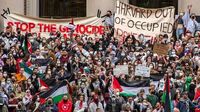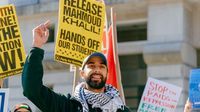In a significant escalation of tensions surrounding immigration and free speech in the United States, U.S. authorities have revoked the visa of Ziyan, a Kashmiri student and organizer for the Palestinian movement in Texas. This decision is part of a broader crackdown on international students, particularly those advocating for Palestine, with hundreds of students in Texas recently discovering their visas marked as ‘terminated’ in the Student and Exchange Visitor Information System (SEVIS).
"I am now no longer a student as ICE has revoked my visa and as of now, I have fled and am in now what is political exile," Ziyan stated, shedding light on the dire consequences of her activism. She believes her political persecution stems from a state effort to suppress support for Palestine. "We are being used as examples to show what the state is capable of," she added, reflecting on the precarious situation faced by many activists.
Ziyan’s journey into activism began when she was raised in the U.S. from the age of six. Her political consciousness was ignited following the colonial annexation of her homeland, Kashmir, in 2019, and further fueled by the Black Lives Matter movement in 2020. At sixteen, she organized a protest in her hometown of El Paso in response to the attacks on Sheikh Jarrah, a pivotal moment that marked her formal entry into activism.
As she continued her advocacy for Palestine at the University of Texas at Austin, Ziyan faced increasing hostility. In April 2024, she was among those arrested during protests against the occupation and encampment. After her arrest, she made a difficult decision to flee, fearing further brutality from ICE. "I would not allow ICE to kidnap me. I ran that Friday and hid for a week – figuring out my plans till I could reasonably secure some sort of transportation out," she recounted.
Despite the challenges, Ziyan remains resolute. "Perhaps the state may think it has won, and perhaps some of you reading this might believe this is a desperate situation — that my exile, and that of many others, means the end of the movement for Palestine, that there is no victory in sight. No such thing will occur — our movement has survived and prevailed despite intense brutalization and suppression," she stated emphatically.
The situation for international students has worsened under the Trump administration, which has been accused of launching major attacks against free speech, particularly against those advocating for Palestine. Since President Trump took office for a second term on January 20, 2025, reports indicate that over a thousand student visas have been revoked, disproportionately affecting Indian students. According to the American Immigration Lawyers Association (AILA), out of 327 reports of visa revocations and SEVIS terminations, 50 percent of the affected students were from India.
In addition to Ziyan’s plight, student activists such as Mahmoud Khalil, Mohsen Mahdawi, and Rumeysa Ozturk remain detained in ICE facilities, highlighting the ongoing repression of pro-Palestine voices in academic settings. Senator Chuck Grassley, Chairman of the Senate Judiciary Committee, has called for investigations into organizations such as Code Pink and the People’s Forum, accusing them of having ties to the Chinese government and attempting to silence dissenting voices.
The People’s Forum has responded to these allegations, asserting that they are part of a dangerous escalation aimed at targeting activists and suppressing peace movements. "The allegations of Chinese government funding are not only false but part of a dangerous escalation to crush dissent, target activists, and silence peace and anti-war movements," they stated.
The context of these accusations is critical, as they tie into a broader narrative of repression under the Trump administration. The People’s Forum connects Grassley’s recent letter to ongoing attacks on democratic rights, including the intimidation of universities and the arrest of students protesting against the Gaza genocide.
In a related development, the publication of "Palestine Across Millennia – A History of Literacy, Learning, and Educational Revolutions" by Nur Masalha marks an important cultural response to the ongoing strife. MEMO Publishers is set to host three book launch events in São Paulo, Brazil, from May 6th to 8th, 2025. This publication completes a foundational trilogy aimed at understanding present-day Palestine through its rich historical narrative.
Masalha’s work challenges the prevailing narratives that often depict Palestine as a land devoid of culture or history. The events will showcase not only his latest title but also previous works that delve into the complexities of Palestinian identity and resistance. Attendees will have the opportunity to explore titles such as "Palestine: A Four Thousand Year History" and "Expulsion of the Palestinians: The Concept of 'Transfer' in Zionist Political Thought, 1882–1948."
Additionally, MEMO Publishing is launching a new book by Ahmad Alzoubi that focuses on the Palestinian presence in five Latin American countries—Brazil, Argentina, Chile, Honduras, and El Salvador. This work, titled "Palestinian Diaspora in Latin America – Media and Identity Studies," revisits the formation of the diaspora and its ongoing connection to Palestine.
The launch events are being organized in partnership with Al Janiah, the Union of Journalists of São Paulo, and the University of São Paulo, with support from the Latin Palestinian Forum and the Middle East Monitor in Brazil. These initiatives represent a concerted effort to foster dialogue and understanding about Palestinian issues, countering the narrative that seeks to erase their history and culture.
As the crackdown on dissent continues, the voices of activists like Ziyan and the cultural contributions of figures like Masalha remain vital in the fight for justice and recognition of Palestinian rights. The ongoing struggle for freedom and self-determination is not just a local issue but resonates globally, echoing the sentiments of those fighting against oppression everywhere.



